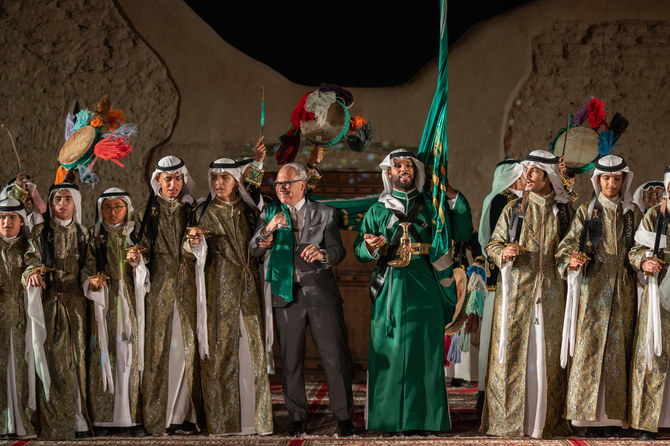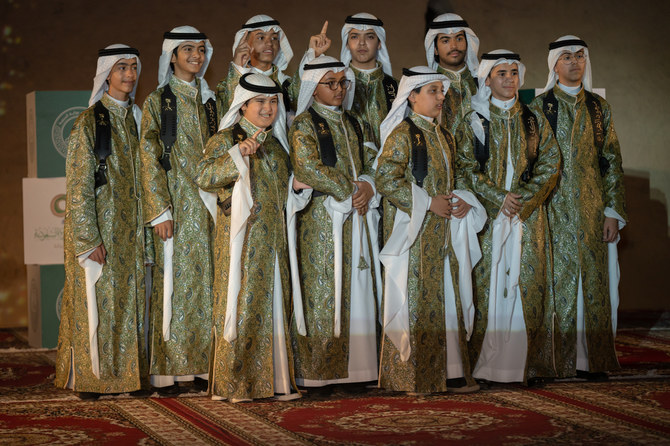RIYADH: The Diriyah Gate Development Authority concluded the third Diriyah House of Ardah initiative as part of its efforts to promote the ancient art form.
The ceremony was held at At-Turaif World Heritage Site to honor 10 finalists out of 80 participants.
Ardah is registered in the UNESCO List of World Intangible Cultural Heritage. The dance features a chant that was once used to rouse warriors facing an enemy. Performers, dressed in traditional costumes, dance with swords to the beat of drums. Combining poetry with masterful displays of swordsmanship, the Ardah represents Saudi loyalty and pride.
In cooperation with the National Center for Saudi Ardah, the initiative trains young people with the help of skilled performers in the art of Ardah to enhance their role in reviving the cultural heritage of the Kingdom.
The training program on Ardah skills is the first of two phases of the initiative, followed by an evaluation stage and a closing ceremony. Participants in the scheme are aged between 12 and 17.
The ceremony included a welcoming of guests at the gate of At-Turaif, followed by an anthem and a royal greeting before the beginning of the Ardah performance.
Jerry Inzerillo, group CEO of the Diriyah Gate Development Authority, delivered a speech after the opening performance.
He highlighted the commitment of the commission in preserving and fostering the cultural and historical identity of the Kingdom.
Inzerillo hailed the success of the initiative as well as the performers who took part in its third edition.
Dr. Badran Al-Honaihen, cultural and historical validation director at the Diriyah Gate Development Authority, discussed the history of the initiative before the closing Ardah dance and honoring of the winning performers.
“Diriyah contains a lot of important intangible heritage, but perhaps the most important of all of its heritage, without a doubt, is the Saudi Ardah, which has many details,” he said.
Abdulrahman Mohammed bin Sabtan, one of the performers, told Arab News: “I have been training for this for about three months. Thankfully, I reached the finals and won tonight.”
Sabtan, Faisal Al-Ghowainim, Mubarak bin Buraik and Ali Al-Shayeb were crowned winners of the scheme.
Many family members of participants were present at the event, with relatives eager to view the hard practice of the Ardah performers in action.
“The event was great. Everything was organized in terms of when it started and how it ended. Their reception was also nice. Everything was beautiful and called for pride in Diriyah and our traditions, especially since I am from Diriyah,” said Arwa bin Faris, a guest and one of the performer’s sisters.
Diriyah celebrates winners of folk dance initiative
https://arab.news/6bvgg
Diriyah celebrates winners of folk dance initiative

- Authority promoting Ardah among young Saudis to preserve cultural heritage
- The training program on Ardah skills is the first of two phases of the initiative, followed by an evaluation stage and a closing ceremony
Nonprofits central to developing education, realizing Vision 2030 goals — Al-Benyan

- Ministry has taken serious steps toward ‘humanizing’ schools and improving educational environment, says Saudi education minister
- Riyadh hosts 2nd nonprofit education, training forum
RIYADH: Serious steps have been taken towards “humanizing” schools and improving the educational environment, helping raise the quality of learning, Saudi Arabia Education Minister Yousef Al-Benyan has said.
The minister was speaking during “Promising Opportunities and Future Foresight for the Nonprofit Sector,” the main session of the second Nonprofit Sector Forum in Education and Training taking place in Riyadh.
The two-day event, hosted by the Ministry of Education, ended on Wednesday. Taking the theme “Qualitative Partnerships and Sustainable Solutions,” it was attended by government officials and stakeholders in education and training, as well as non-profit sector representatives.
The minister said that the school environment accounted for roughly one-third of the factors influencing educational outcomes, alongside curricula and teachers.
“We have begun improving the humanization of schools and are working to leverage the ministry’s programs to support the educational environment within an integrated vision that seeks to provide a healthy and stimulating environment within schools,” he said.
He added that the non-profit sector was a key partner, alongside the public and private sectors, in developing education and achieving the goals of Saudi Vision 2030.
The ministry was working to develop teachers through capacity-building programs and ensure the quality of outcomes, said Al-Benyan, highlighting the establishment of a national center for curriculum development for the first time, in partnership with experts and specialized institutions.
He also talked about the launch of initiatives to improve the educational environment and create attractive and stimulating school facilities, in addition to strengthening governance and accountability to ensure the sustainability of impact and measure returns.
The ministry established the Tatweer foundation to support the needs of teachers and last year signed 18 agreements encompassing more than 2,400 programs. It also implemented initiatives worth more than SR400 million through the Ehsan platform and contributed to providing more than 2,700 scholarships in cooperation with the Martyrs, Missing Persons and Prisoners Fund.
Cabinet decisions have enabled the Ministry of Education, in cooperation with the Ministry of Municipalities and Housing, to allocate buildings and sites to non-profit schools using new methods that help expand the scope of support and providing sustainable resources.
The minister emphasized the importance of programs such as vocational training for teachers through the National Institute for Teacher Development and the National Curriculum Center to enhance the quality of education and promote community partnerships.
The forum also featured a “Volunteer Hour” in which several education, training and non-profit sector officials took part.
Other sessions included “Building Human Capacity in the Non-Profit Sector: Programs and Initiatives,” which discussed linking training programs to the labor market and the role of employers in identifying them.
“Empowerment Across Sectors: Enhancing the Effectiveness of Non-Profit Training” addressed mechanisms for improving the quality of non-profit training and the potential of the national skills system, while “Early Childhood in the Nonprofit Sector: Empowerment Opportunities and Impact Models” reviewed opportunities for expansion and excellence in nonprofit kindergartens. “The Nonprofit Sector and Programs for People with Disabilities” focused on the reality and expectations of nonprofit organizations in programs for people with disabilities.
The first day of the forum featured three specialized workshops addressing services provided by the National Center for Strategic Partnerships to empower nonprofit entities, while around 50 exhibitors the "Generation Alpha: Research Insights for Understanding the Next Generation and Formulating Inspiring Educational Programs" workshop by Ithra Center, and the "Empowering Nonprofit Kindergartens: Practical Steps" workshop.
About 50 exhibitors presented the opportunities they offer for collaboration in the education sector.
Turaif traces historical, cultural mosaic to pre-Islamic era

- Evidence of Stone Age settlements in the region
- Has Tapline, Kingdom’s first industrial heritage site
TURAIF: Located in Saudi Arabia’s Northern Borders region, Turaif governorate stands as a crossroads of ancient civilizations and a gateway to Iraq and the Levant.
The governorate is home to a range of rich cultural and heritage sites, many of which date back to pre-Islamic times.

Among the most prominent heritage landmarks is the archaeological site of Qasr Duqrah, situated 40 km southwest of the governorate.
Adjacent to it lies a mountain known as Aqran, also referred to as Duqrah Mount, which has been recorded under the Comprehensive Archaeological Survey Program.
Zahi Al-Khalawi, a member of the Saudi Historical Society, said the site is among the Kingdom’s most significant archaeological locations because there is evidence of human settlements dating to the Stone Age.
He said habitation at the site continued through the later Roman period (2 to 6 centuries C.E.) and persisted into the Umayyad era (661 to 750 C.E.).
Another landmark is the Trans-Arabian Pipeline, or Tapline, one of Saudi Arabia’s most significant industrial heritage sites.
The pipeline stretches from the east of the Kingdom to its north, passing through Turaif, and has been registered in the National Industrial Heritage Register.

It is the first documented industrial heritage site in the Kingdom, representing the early stages of Saudi Arabia’s oil industry and its developmental and economic significance.
Also noteworthy is the culturally significant site of Qaru Turaif, a water source developed by the Tapline Co. in the 1950s to help settle nomadic communities by order of the late King Abdulaziz.
To the east of Turaif, about 25 km away, stands Jabal Umm Waal, a historic landmark and northern gateway into the Arabian Peninsula.
The mountain tells the stories of Bedouin life and the passage of trade caravans and pilgrims traveling from the Levant and Iraq. For centuries, it served as a safe route for travelers making their way southward.
Saudi Arabia condemns Israeli minister’s call for sovereignty over occupied West Bank

- Kingdom’s foreign ministry said the move would violate international laws
RIYADH: A government minister’s threat for Israel to apply full sovereignty over the occupied West Bank was strongly condemned by Saudi Arabia on Wednesday.
The Ministry of Foreign Affairs said the Kingdom “condemned and denunciated” the statement made by the Israeli official calling for the imposition of sovereignty over the Palestinian territory.
Such action would be a violation of international law, the statement said. Saudi Arabia rejects any attempts to expand settlements on Palestinian land, the ministry added, while reiterating the Kingdom’s position on the importance of Israel abiding by international resolutions.
The statement followed comments from Israel’s Justice Minister Yariv Levin saying “the time has come” for Israel to apply sovereignty across the West Bank.
Israel occupied the West Bank and East Jerusalem in 1967 and has built dozens of settlements, deemed illegal under international law, across the territory.
The Saudi foreign ministry offered its support for the Palestinian people in restoring their legitimate rights and in establishing a Palestinian state on the 1967 borders, with East Jerusalem as its capital.
Saudi ministry recalls faulty chargers over fire risk

RIYADH: Saudi Arabia’s Ministry of Commerce has announced the recall of 88,518 Anker portable chargers across multiple models due to a potential internal electrical short circuit that may cause overheating and pose a fire risk.
The ministry urged consumers to immediately stop using the affected products and contact Anker at the toll-free number 8008500030 to arrange a replacement or full refund, the Saudi Press Agency reported on Wednesday.
Consumers can check if their device is included in the recall and start the replacement or refund process by visiting anker.com/mmrc2506.
Users are also advised to verify the model number of their charger against the list of affected products on the Defective Products Recall Center website ecalls.sa.
The ministry reaffirmed its commitment to consumer safety and stressed the importance of promptly addressing product defects to prevent potential hazards.
GCC passports departments chiefs hold meeting

Gulf Cooperation Council Secretary-General Jasem Albudaiwi participated in the 39th Meeting of the Directors-General of Passports of the GCC countries, held on Wednesday at the headquarters of the General Secretariat in Riyadh.
During the meeting, he reviewed the latest developments, including the Gulf visa project.
The passport departments of the interior ministries of GCC countries, through a series of joint meetings, are making efforts to launch a unified tourist visa project in the near future, the General Secretariat said in a report.
“Everyone is working as one team to keep pace with technological developments and security requirements in a world characterised by rapid change,” Albudaiwi said.























